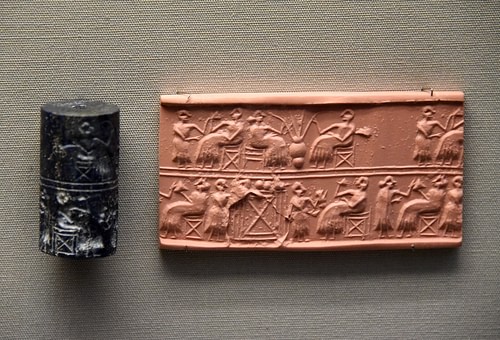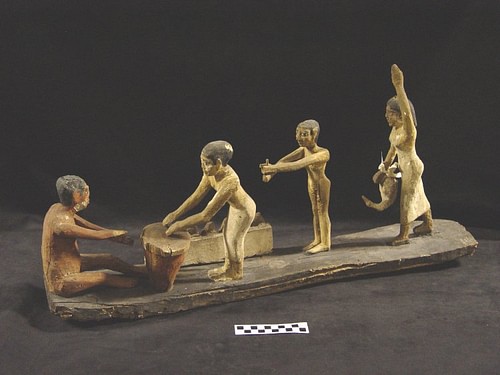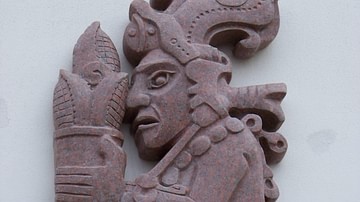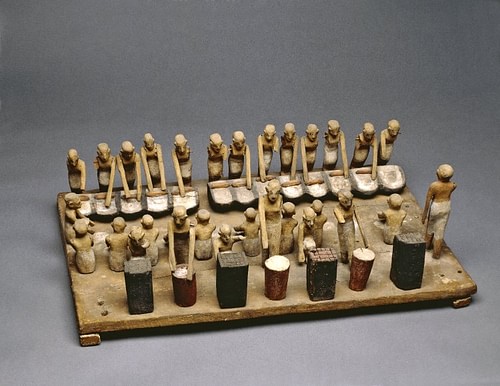
Beer is one of the oldest intoxicating beverages consumed by human beings. Even a cursory survey of history makes clear that, after human beings have taken care of the essential needs of food, shelter, and rudimentary laws for the community, their next immediate concern is developing intoxicants.
Evidence of early beer brewing has been confirmed by finds at the Sumerian settlement of Godin Tepe in modern-day Iran going back to between 3500-3100 BCE but intoxicants had already become an integral aspect of daily human life long before. Scholar Jean Bottero writes:
In ancient Mesopotamia, among the oldest 'civilized people' in the world, alchoholic beverages were part of the festivities as soon as a simple repast bordered on a feast. Although beer, brewed chiefly from a barley base, remained the 'national drink', wine was not uncommon. (84)
Although wine was consumed in Mesopotamia, it never reached the level of popularity that beer maintained for thousands of years. Sumerians loved beer so much they ascribed the creation of it to the gods and beer plays a prominent role in many of the Sumerian myths, among them, Inanna and the God of Wisdom and The Epic of Gilgamesh. The Sumerian Hymn to Ninkasi, written down in 1800 BCE but understood to be much older, is both a praise song to the Sumerian goddess of beer and a recipe for brewing.
Brewers were female, most likely priestesses of Ninkasi, and early on beer was brewed by women in the home as a supplement to meals. The beer was a thick, porridge-like drink consumed through a straw and was made from bippar (barley bread) which was baked twice and allowed to ferment in a vat. By the year 2050 BCE beer brewing had become commercialized as evidenced by the famous Alulu beer receipt from the city of Ur dated to that time.
The Origin & Development of Beer
It is thought that the craft of brewing beer began in domestic kitchens when grains used for baking bread were left out unattended and began to ferment. Scholars Jeremy Black and Anthony Green, to name only one authority on the subject, write, "alcoholic beverages probably resulted from an accidental discovery during the early hunter-gatherer stage of human prehistory" (Gods,28). While this theory has long been accepted, scholar Stephen Bertman advances another and discusses the long-standing popularity of the drink:
Though bread was basic to the Mesopotamian diet, botanist Jonathan D. Sauer has suggested the making of it may not have been the original incentive for raising barley. Instead, he has argued, the real incentive was beer, first discovered when kernels of barley were found sprouting and fermenting in storage. Whether or not Sauer is right, beer soon became the ancient Mesopotamian's favorite drink. As a Sumerian proverb has it: "He who does not know beer, does not know good." The Babylonians had some 70 varieties, and beer was enjoyed by both gods and humans who, as art shows, drank it from long straws to avoid the barley hulls that tended to float to the surface. (292)
The scholar Max Nelson also rejects the claim that brewing beer was discovered accidentally, writing:
Fruits often naturally ferment through the actions of wild yeast and the resultant alcoholic mixtures are often sought out and enjoyed by animals. Pre-agricultural humans in various areas from the Neolithic period on surely similarly sought out such fermenting fruits and probably even collected wild fruits in the hopes that they would have an interesting physical effect (that is, be intoxicating) if left in the open air. (9)
Beer became popular, not only because of the taste and its effects but because it was healthier to drink than the water of the region. Scholar Paul Kriwaczek details how the waste disposal systems of the cities of Mesopotamia were intricately designed to deposit human and animal waste outside the city walls, and yet that was precisely where the water supply was usually located. Kriwaczek notes how this was "a magnificent engineering achievement but a potential disaster for public health" (83). The best waters were far from the cities but nearby streams could be tapped for water to make beer which was safer to drink because of the fermenting process which involved boiling the water. Kriwaczek continues:
If the watercourses were unsafe, boreholes and wells were no more providers of drinking water, as the saline water-table was too close to the surface. Beer therefore, sterilized by its weak alcohol content, was the safest drink, just as in the western world, as late as Victorian times, it was served at every meal, even in hospitals and orphanages. In ancient Sumer, beer also constituted a proportion of the wages paid to those who had to serve others for their living. (83)
Beer became the drink of choice throughout the region and especially so once it developed into a commercial enterprise. At this point, it seems, the business was taken over by men who recognized how lucrative it could be and women - the traditional brewers - continued on under their supervision. The brew was all hand-crafted, of course, but as it gained in popularity was made in greater quantities and this led to the development of larger-scale breweries. Scholar Gwendolyn Leick comments:
Beer was produced mainly from barley. From the pounded grain, cakes were molded and baked for a short time. These were pounded again, mixed with water, and brought to fermentation. Then the pulp was filtered and the beer stored in large jars. Mesopotamian beer could be kept only for a short time and had to be consumed fresh. The cuneiform texts mention different kinds of beer, such as "strong beer", "fine beer", and "dark beer". Other sorts were produced from emmer or sesame, as well as dates in the Neo-Babylonian Period and later. (33)
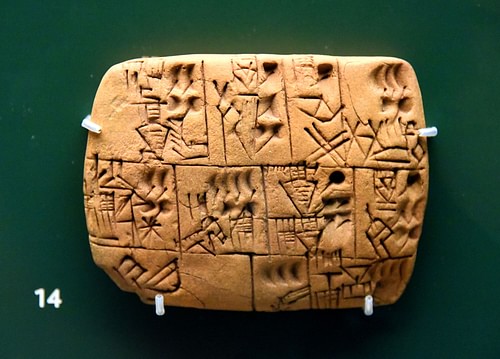
The gods were thought to have given beer to humanity and so beer was offered back to them in sacrifice at the temples throughout Mesopotamia. As noted, it was also used to pay wages and was consumed readily at religious festivals, celebrations, and funeral ceremonies. Beer was associated with good times as a drink which made one's heart feel light and allowed one to forget one's problems.
In The Epic of Gilgamesh, for example, the hero, distraught over the death of his friend, sets out on a quest for immortality and the meaning of life. In his travels, he meets the barmaid Siduri who suggests he leave off such lofty aspirations and simply enjoy life while he lives; in short, she tells him to relax and have a beer. Beer was widely enjoyed for a variety of reasons and under virtually every sort of circumstance. Black and Green write:
That commercialized social drinking, not for religious or medicinal purposes, was common by at least the early second millennium BC is attested by the laws of Hammurabi of Babylon regulating public houses. (Gods, 28)
Although the Sumerians had first developed the craft of brewing, the Babylonians took the process further and regulated how it was brewed, served, and even who could sell it. A priestess who had been consecrated to a deity, for example, was allowed to drink as much beer as she pleased privately but was prohibited from opening a tavern, serving beer, or entering a tavern to drink publicly like a common woman.
As with the brewing process itself, the first bartenders were women as the Code of Hammurabi makes clear. Among other regulations, Hammurabi's code threatens death by drowning for any woman tending bar who pours a 'short measure' of beer for a customer; meaning anyone who does not fill the customer's vessel in accordance with the price paid.
Beer Travels the World
Through trade, beer traveled to Egypt where the people embraced the brew eagerly. Egyptians loved their beer as much as the Mesopotamians did and breweries grew up all around Egypt. As in Mesopotamia, women were the first brewers and beer was closely associated with the goddess Hathor at Dendera at an early stage. Scholar Richard H. Wilkinson writes:
Hathor was associated with alcoholic beverages which seem to have been used extensively in her festivals, and the image of the goddess is often found on vessels made to contain wine and beer. Hathor was thus known as the mistress of drunkenness, of song, and of myrrh, and it is certainly likely that these qualities increased the goddess's popularity from Old Kingdom times and ensured her persistence throughout the rest of Egypt's history. (143)
Although Hathor encouraged people to freely express their joy in life through drink, it should be noted that drinking to excess was only appropriate under certain conditions. Neither Hathor nor any of the other Egyptian deities smiled upon drunk workers or those who abused alcohol to another's detriment. The universal principle of ma'at (harmony and balance) allowed for excessive drinking but always in balance with the rest of one's daily responsibilities, one's family, and the larger community.
Hathor was not the primary goddess of beer, however; the Egyptian goddess of beer was Tenenit (from one of the Egyptian words for beer, tenemu) and it was thought the art of brewing was first taught to her by the great god Osiris himself. Like Ninkasi in Sumer, Tenenit brewed her beer from the finest ingredients and oversaw every aspect of its creation.
The final result of her efforts was a brew which was enjoyed throughout the land in a number of different varieties. Workers at the Giza plateau received beer rations three times a day and prescriptions for various ailments included the use of beer (over 100 recipes for medicines included the drink). As in Mesopotamia, beer was thought to be healthier than drinking water and was consumed by Egyptians of all ages, the youngest to the oldest.
From Egypt, beer traveled to Greece (as evidenced by the similarity of another of the Egyptian's word for beer, zytum and the ancient Greek for the beverage, zythos). The Greeks, however, as the Romans after them, favored strong wine over beer and considered the grainy brew an inferior drink of barbarians. The Roman Emperor Julian even composed a poem extolling the virtues of wine as a nectar while noting that beer smelled like a goat. That the Romans did brew beer, however, is evidenced by finds at the Roman outpost in Regensburg, Germany - founded in 179 CE by Marcus Aurelius as Casta Regina - as well as at Trier and other sites.
The Fall & Rise of Beer
As the Roman Empire spread, so naturally did Roman culture and tastes. Since the Romans favored wine over beer, beer was considered a distasteful “barbarian beverage” as compared with the cultivated and higher-class drink of wine. Even so, it seems it was primarily the Celts who were first responsible for wine's preferential status over beer as they also considered beer an unfit drink for a man. Nelson writes:
Beer was thought to be an inferior type of intoxicant since it was (at least often) affected by the corrupting power of yeast and was naturally a 'cold' and hence effeminate substance while wine was thought to be unaffected by yeast and to be rather a 'hot' and hence manly substance. (115-116)
The Gauls were “addicted to the wine imported by Italian merchants which they drank unmixed [with water] and in immoderate amounts to the point of falling into stupors” and also that they were so enamored of wine that they would “exchange a slave for one jar of Italian wine” (Nelson, 48-49). However poorly beer was viewed by the prevailing elite, though, their attitude did nothing to stop people from brewing the drink.
As Nelson makes clear throughout his work, The Barbarian's Beverage: A History of Beer in Ancient Europe, the brew recognized in the modern day as 'beer' developed in Germany and their brewing techniques then influenced further development throughout Europe. The Germans were brewing beer as early as 800 BCE and their early methods mirrored those of the ancient Sumerians in regard to purity of the brew but with the important addition of hops. Women were also the first brewers in Germany and beer was made from only fresh water, heated, and the best grains. The tradition continued down into the Christian era when monks took up the craft of brewing and sold beer from their monasteries.
Beer was still considered a divine gift, now given by the Christian god, and the evils which might arise from drunkenness was ascribed to the devil (Nelson, 87). The biblical injunction to refrain from drunkenness (Ephesians 5:18) was not thought to apply to the drink itself but rather to overindulgence which opened the door for darker powers to enter one's life rather than one being filled with the Holy Spirit sent from God. This view of beer is similar to that of the people of ancient Mesopotamia who blamed an individual for overindulgence in drink, and the attendant problems which might arise, but never the drink itself.
By 770 CE, the Christian champion Charlemagne was appointing brewers in France and, like the Babylonians before him, regulated the production, sale, and use of it. Beer was still understood to be healthier to drink than water because of the brewing process and continued to be associated with a divine origin; its popularity also continued undiminished. The Finnish epic, The Kalevala (written in the 17th century CE, but based on much older tales) devotes more lines to beer than to the creation of the world and praises the effects of beer in such a way that they would easily be recognizable to anyone from ancient Sumer to a modern-day drinker.
Brewers continued to enjoy a special status in their communities until the 19th and 20th centuries CE when temperance groups gained political power in the United States and areas of Europe and were able to effect prohibition to greater or lesser degrees. Even so, the long-established popularity of intoxicants among human beings could not be suppressed by legislation and all the acts of all the governing bodies would not stop brewers and vintners from rising again. In the modern day, beer is as lucrative a commercial venture as it was in the ancient world and the drink retains its popularity on an international scale. Whether an individual is experiencing good or bad times, beer continues to enjoy the same high status it did in ancient Mesopotamia: the drink which makes one's heart feel light.
